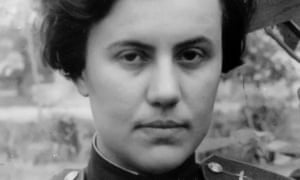Irina Rakobolskaya Member of the all-female Guards Night Bomber Aviation Regiment of the Red Army, dies at 96. RIP comrade
Irina Vyacheslavovna
Rakobolskaya, physicist and second world war veteran, born 22 December 1919;
died 22 September 2016
During the second
world war, Irina Rakobolskaya, who has died aged 96, was a member of the
all-female Guards Night Bomber Aviation Regiment of the Red Army that
became known as the “night witches”. The unit was secretly formed, with the
authorisation of Joseph Stalin, in October 1941, with Adolf Hitler’s Wehrmacht
at the gates of Moscow, and Rakobolskaya, then a 21-year-old physics student at
Moscow State University, volunteered to join. She went on to become the
regiment’s chief of staff and a chronicler of its achievements. After the war,
she returned to MSU and graduated in 1949. She forged a career in the physics
of elementary particles and became professor of physics at the university, but
her experience with the celebrated “night witches” defined her long life.

Major Irina Rakobolskaya in the early 1940s
The daughter of a
school teacher, Varvara (nee Shevlyakova), and a physics lecturer, Vyacheslav
Rakobolsky, Irina was born in Dankov, 300km south of Moscow, on the river Don.
The family moved to Moscow in 1932, after her father’s death. Rakobolskaya was one
of the few Soviet women to be admitted before the war to MSU, which she entered
in 1938, a dark year in Soviet political history with Stalin’s purges still
under way. Three years later, with 17 other female students of MSU, she
unhesitatingly forsook her studies to answer the call for women to join the Red
Army’s air wing.
She did so, she later
said, not for Stalin or for the Communist party, but primarily for patriotic
reasons: to defend her homeland. With her skills in physics and mathematics,
she was trained as a navigator, but instead of flying, she was appointed
regimental chief of staff, much to her initial disappointment. She cried
because she wanted to fight on the front lines.
But her regiment did
so, flying an extraordinary 24,000 sorties, in tiny, flimsy biplanes, in three
years – all the way to Germany. Their stealthy, low-level, night-time bombing
raids earned them the disparaging sobriquet “night witches” from their German
enemy; it was a term these young women embraced with pride. Despite initial
doubts about their fighting capabilities on the part of their male Red Army
comrades, the regiment won 23 Hero of the Soviet Union medals, the highest
military award. Their valour came at a cost – 32 dead – which caused
Rakobolskaya lasting grief. On 9 April 1944 she personally witnessed the death
of 23-year-old Yevgeniya Rudneva, shot down in flames.
After the war,
Rakobolskaya kept the memory of these young women alive, publishing Rudneva’s
diary and her own memoirs and poetry, giving numerous interviews, and
participating in annual regiment reunions in front of the Bolshoi theatre in Moscow.
She took her wartime
conviction that “a woman can do anything” into her distinguished postwar career
as a physicist at MSU. She studied cosmic rays – high-energy particles flying
all over the universe at approaching the speed of light. She authored or
co-authored some 300 academic publications, including six books and a textbook
on nuclear physics. She was appointed professor of physics in 1977, and from
1994 held the lifetime position of distinguished professor.
From 1987 until 1997
she chaired the Union of Women at MSU. She became a member of the university’s
academic council and of the Russian Academy of Sciences’ scientific council on
cosmic rays. Between 1966 and 1990 she was a chair of a special department
attended by professors from other universities to upgrade their knowledge and
qualifications. A documentary on her life was broadcast on Russian television
in 2013. She was honoured with numerous military and civil awards.
Her husband, Dimitri
Linde, whom she married in 1946, died in 2005. Rakobolskaya is survived by
their two sons, Andrei and Nikolai.
see also
